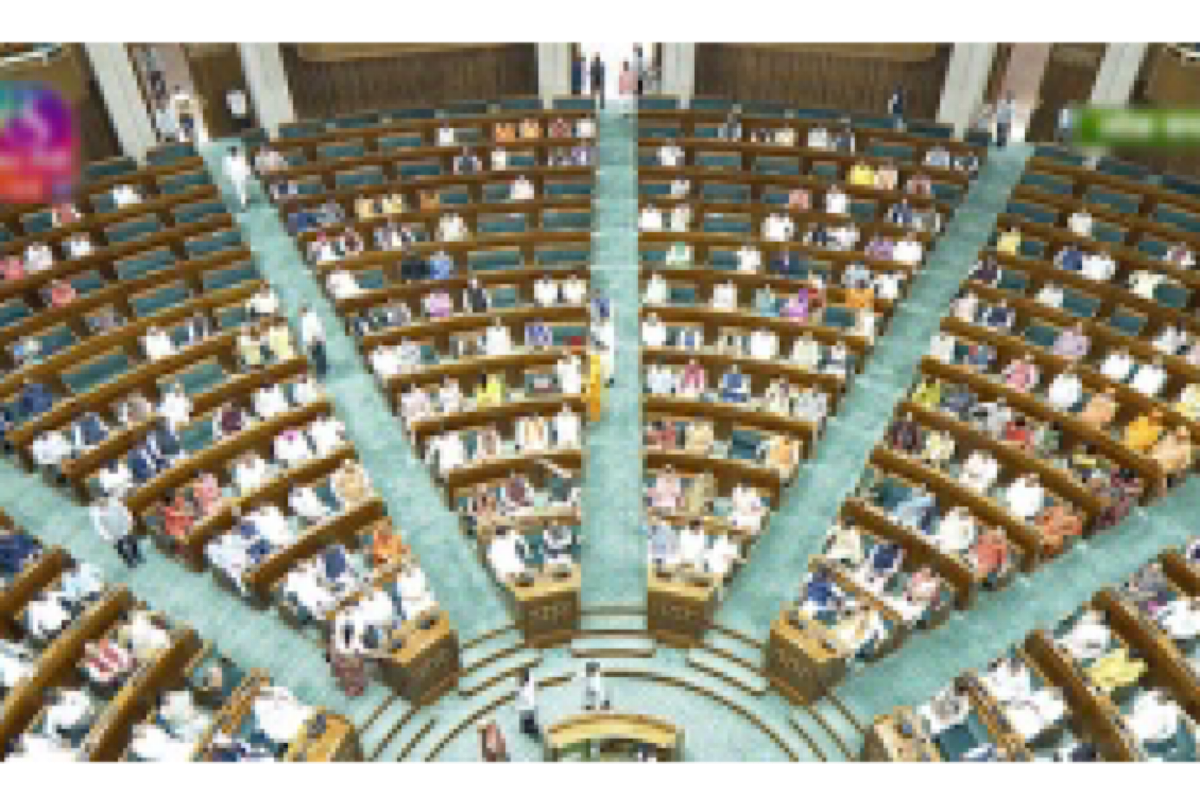Parliament adjourned, to reconvene on March 10
Parliament was adjourned on Thursday and will reconvene on March 10, in the second and final half of the Budget session.
The just-concluded Winter session of Parliament has been a washout due to a confrontation between the Opposition and the Government.

Lok Sabha in New Parliament Building (Photo:IANS)
The just-concluded Winter session of Parliament has been a washout due to a confrontation between the Opposition and the Government. The growing divide between the treasury benches and the Opposition is a worrying trend. It is not for the first time that an entire session has been washed out. A severe security breach occurred on December 13.
Two unauthorised individuals entered the House while the session was on and threw smoke canisters, creating panic. How they jumped from the visitor’s gallery was a mystery, after having escaping undetected despite five-tier security. There have been attacks on the Parliaments of other countries, too. To name a few, there was the 1981 Spanish coup attempt; the 2017 U.K. Parliament terror attack; the 1987 Sri Lankan Parliament grenade attack; the 2021 U.S. Capitol attack and the October 2023 Turkish government building attack Aghast at the incident, the Opposition demanded Home Minister Amit Shah make a statement in the House, but Shah declined. Had Shah made a statement, even a brief one, the confrontation would not have escalated. It led to a commotion, and as a result, the two presiding officers suspended an unprecedented number of 146 members.
Advertisement
Most belonged to the opposition party coalition, the INDIA Alliance. According to the rules, suspension occurs under two circumstances. One is when a member disregards the authority of the Chair, and the second is when a member wilfully and persistently obstructs the proceedings of the House. In this case, the members defied the Speaker and the Rajya Sabha Chairman.
Advertisement
After December 13, Parliament was deadlocked as the Opposition disrupted the proceedings. Several opposition leaders accused the Government of intentionally suspending many leaders to pass crucial bills without debate. The Modi government has justified the suspensions.
They argued that the opposition members had insulted the institution of Parliament. One member even mimicked the Rajya Sabha chairman, Jagdeep Dhankhar. Members defied Speaker Om Birla also. Meanwhile, unfazed by the protests, the Government chose to push through crucial legislation, including the Criminal law amendments, with empty Opposition benches on the other side.
The Opposition had condemned this. These recent developments will worsen the already strained relationship between the Opposition and the government. Ahead of the 2024 Lok Sabha polls, they seemed disinterested in ensuring Parliament ran smoothly. Everyone needs to work together in Parliament, but unfortunately, it isn’t a priority for either side. The public is appalled by the behaviour of the Opposition and the subsequent unprecedented suspension of 146 members.
They are disappointed that instead of addressing the concerns of their constituents, members have resorted to such disorderly conduct. Many agree that the Opposition had a valid request for a statement from Shah, but their approach was inappropriate. MPs have five essential functions. They are law-making, budget scrutiny, oversight responsibility, representative role, and holding the Government accountable. Ideally, they must fulfil these duties. Are the members performing their responsibilities?
Not entirely. Many MPs do their best in their work. They highlight issues on the floor of Parliament to establish their grasp of specific topics. But this can happen only when there is order in the House. When Parliament is not functioning for most sessions, how can they perform their duties? After all, while the Opposition should have its say, the Government should also have its freedom. In the 1950s and 1960s, Parliament was more homogeneous. Congress was the dominant party. Notable freedom fighters represented the people. The discussions and debates were of high quality. However, in 1969, the Congress party split, and Prime Minister Indira Gandhi acted high-handedly.
The coalition era began in 1989, and there have been many instances of Parliament paralysis. Returning to the present crisis, while it is the business of the Government to ensure the smooth running of Parliament, the Opposition must also provide constructive criticism. Parliament is weaker due to the lack of more discussions and scrutiny of laws; after all, members are called lawmakers for a reason. Former chief justice N.V. Ramana lamented the lack of scrutiny of the bills. Recognising the value of parliamentary debates in shaping public opinion is essential.
Lawmakers must ensure that necessary modifications and revisions are made to a bill to achieve its intended objective. They must study and scrutinise the laws and detect the loopholes. The Constitution assigns the task of creating laws to the legislature. At the same time, the Government is responsible for executing them, and the judiciary is tasked with enforcing them. To have a thriving democracy, Parliament must function effectively.
To achieve this, better coordination between the Opposition and the Government is necessary. Unfortunately, neither side made any attempts to compromise, resulting in conflict. Coordination is vital to ensure that Parliament operates efficiently and without any obstacles.
Advertisement